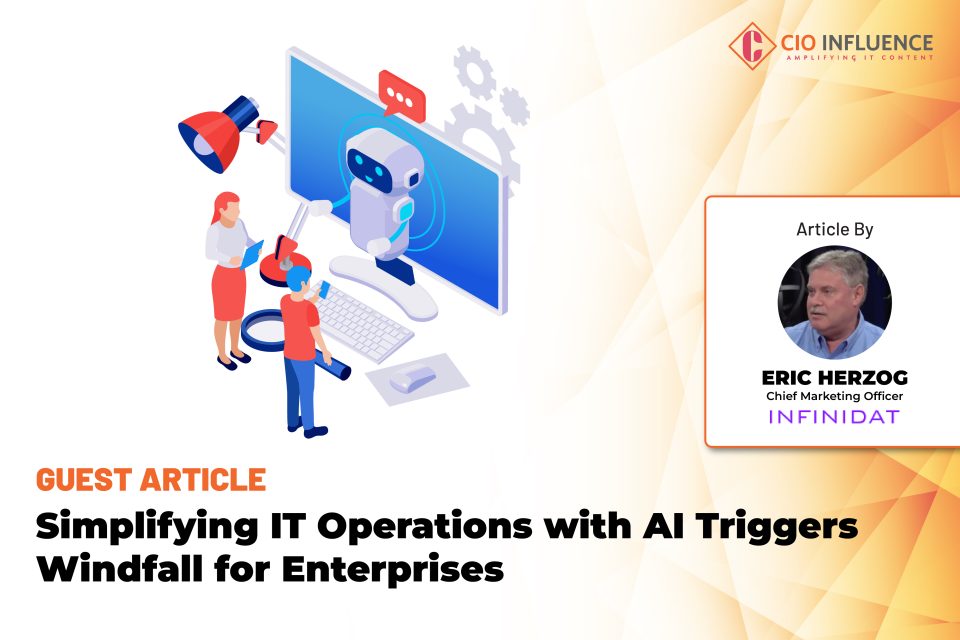With data volumes, applications and workloads increasing exponentially, the need for Artificial Intelligence for IT Operations (AIOps) is already surging. The AIOps market size is estimated at $27.24 billion in 2024, and it is expected to reach $79.91 billion by 2029, growing at a CAGR of 24.01% during the forecast period (2024-2029), according to the research firm Mordor Intelligence.
Also Read: Unlocking Growth and Profitability: Creating High-Performance Operations Through Organization-Wide Data Observability
AIOps in enterprise storage is a key aspect to simplifying IT operations, reducing administrative overhead, and adding a predictive layer onto the enterprise storage infrastructure. It’s increasing in importance because of the industry shift toward a platform approach to enterprise storage. The appeal of the smart use of AI to handle the complexities of IT operations is obvious, and it’s directly tied in with an enterprise’s storage infrastructure.
As enterprises move more into hybrid multi-cloud deployments and operating models, the IT team needs to be bringing in these kinds of AIOps capabilities across the entire enterprise infrastructure stack. Astute IT professionals are keen to exploit the underlying capabilities of their installed infrastructure. IT must build upon a foundation of the highest performing, most available, and most intelligent infrastructure.
When you have dozens or even hundreds of storage arrays and you have tens to hundreds of petabytes in your environment, you need AI intelligence within the infrastructure, along with intelligent pieces that plug into broader management tools, as part of broader AIOps capabilities. The more you can get automated and the more you can use AIOps to not think about the mechanics of your organization’s infrastructure, the better off you and your enterprise will be.
Storage-as-a-Service
AIOps supports scalable, multi-petabyte storage-as-a-service (STaaS) solutions, enabling enterprises to centralize operations and improve cost management. The advantage of AIOps is that the flexibility of capacity and workloads is much better managed.
Enterprises benefit greatly from the capabilities that come with AIOps: advanced predictive analytics, early issue detection, and proactive support, which are integral to enabling the storage-as-a-service experience. This helps to tailor the STaaS experience to enterprise requirements and economics throughout the deployment lifecycle.
In addition, inputs and outputs (I/Os) can automatically be balanced across infrastructure to improve performance without the need for manual intervention, reducing OPEX and operational manpower needs.
Analytics and AI
AIOps is an approach that combines automation with analytics and AI. It can be AI/ML (machine learning), or better yet, AI/DL (deep learning), on a multi-layered technology platform. What helps an enterprise is technology enhancing enterprise data storage with built-in intelligence that optimizes application environments and performance over time, delivering a zero-touch, set-it-and-forget-it experience. This is what IT buyers within large organizations should aim for.
This software capability adapts to changing application, user and performance demands – without administrative overhead. The ideal software solution enables 100% SLA-based guarantees, predictive abilities, and optimal combinations of underlying media. It’s to an enterprise’s benefit to get an end-to-end dynamic perspective on their entire storage environment with optimized AIOps, leveraging a platform approach for STaaS.
Also Read: Security Fabric, Evolution of Data Management
As IT becomes increasingly complex, repetitive operational and administrative tasks are taking up much more time. Siloed storage that requires individual management and maintenance adds to the complexity and prevents consolidated data views and insights. However, using Storage-as-a-Service with AIOps solves this challenge.
A consolidated management layer, driven by AI and deep learning, dramatically enhances IT operations. AIOps provides simplified, automated remediation actions across multiple areas for reduced time spent troubleshooting, simplified complexity and predictive capabilities.
Analytics can be applied for both predictive insight and predictive support operations. IT operations can be streamlined through future prediction of both failures and performance bottlenecks, proactive maintenance, and centralized automation.
Predictive Approach
AIOps can effectively identify actual and potential issues before they can cause widespread problems, automate troubleshooting and fixes, and deliver more effective and more efficient support within STaaS infrastructure. But it goes even a step further. AIOps has a predictive capability that give IT operations true insight into the future.
This insight enables better capacity planning as well as futureproofing the storage infrastructure. This directly solves the traditional problem of predicting capacity requirements with any level of accuracy. With AIOps in the mix, AI helps IT operations better understand current needs and trends to determine when extra capacity will be needed.
Components of AIOps That Connect
CIOs, CISOs and other IT leaders should look for three components in AIOps: the vendor that provides the pieces of the enterprise infrastructure for customers should have intelligence built within their systems; this intelligence should help connect their systems together; and it should plug into whatever broader data center/hybrid multi-cloud AIOps management framework or tools they intend to use across their environment.
Increasing intelligence baked into enterprise infrastructure is a key ingredient to facilitate the shift to AIOps-optimized data centers. This AI revolution in the data center will make enterprise storage ever more important.
[To share your insights with us as part of editorial or sponsored content, please write to psen@itechseries.com]


